A GUIDE TO BOOKKEEPING AND ACCOUNTS FOR SMALL BUSINESS
Paul Welwyn
Straightforward Guides
Straightforward Guides
Straightforward Publishing 2015
All rights reserved. No part of this publication may be reproduced in a retrieval system or transmitted by any means, electronic or mechanical, photocopying or otherwise, without the prior permission of the copyright holders.
eISBN
978-1-84716-638-8
Printed by 4edge www.4edge.co.uk
Cover design by Bookworks Islington
Whilst every effort has been made to ensure that the information contained within this book is correct at the time of going to press, the author and publisher can take no responsibility for the errors or omissions contained within.
CONTENTS
Introduction
The world is now a much tougher place for businesses and unfortunately many fail. Apart from the fortunes of the market, the most common reasons are connected with what might be called sloppy management. Not paying attention to the routine but essential tasks can lead to the collapse of any business.
All businesses must therefore be managed, no matter what their size or complexity. Management means the control and co-ordination of all the constituent parts of a business - sales, purchases, production, distribution, credit, tax, etc. etc. A common denominator is therefore necessary to explain and clarify the whole range of business activities, and that common denominator is money.
Spending money and receiving money is a constant process and each transaction must therefore be reduced to a monetary expression and then recorded in a Book of Account. The process of recording all this information relating to the financial affairs of the business is Bookkeeping.
Financial management means keeping track of all money coming in and going out, whether cash or cheque, where it comes from, where it goes to, how long it takes, what is being purchased and what is being sold.
In addition to managing books and accounts, this book covers basic financial management, the formulation of budgets and management of cashflows. This builds on the actual recording of expenditure. Once the business manager has mastered the art of bookkeeping and accounts and formulation of budgets and monitoring of cashflow then the practice of business management will be that much easier and the prospects of survival that much greater.
Ch. 1
The Books to Keep
Businesses can be Sole Traders, partnerships, Limited Company or a Limited Liability partnership. What binds all business is the need to keep books of account and present final accounts to HMRC.
Sole Trader
This is a self employed individual who is personally financially responsible if things go wrong, for example if the business cannot pay its debts and taxes. If problems occur the individuals home and assets may be at risk.
A Partnership
This is more than one self-employed person working together to make a profit and sharing everything on an agreed split. each partner is personally responsible for all debts run up by the partnership as a whole except for tax debts (individuals are responsible for their own tax debts).
A Limited company
This is a separate legal structure where the liability of owners of the business is limited to the amount of their shares. Any legal action has to be against the company not the shareholders and the shareholders personal assets are safe.
A Limited Liability Partnership
This has many of the features of a normal partnership-but it is like a limited company in that members of an LLP cannot usually lose more than they invest.
Business accounts
Accounts are a summary of the business financial activities for a period of time, commonly 12 months. Accounts can also be referred to as financial statements. A business will need accounts to see how the business is doing, to raise money for the business (bank managers will always want to see accounts), to raise money for the owners, i.e. for loans and mortgages, for insurance claims, for making tax returns, for partners in a partnership to see what is their share, for businesses which are a company for filing with Companies House and, finally, when it comes to sell the business then the purchaser will want to see past and current accounts.
Using an accountant
You can either use an accountant or prepare your accounts yourself. This will depend on the type and complexity of your business. A bank or building society lending money will always, without exception want to see your final accounts prepared by an accountant, someone who is independent of the business. Many lenders will ask for copies of tax returns if the businessman is a sole trader or partnership as their tax returns show the accounts figures, provided the tax returns are prepared by a qualified accountant.
HM Revenue and Customs will expect profits of a business to be calculated in accordance with current accepted accountancy principles. HMRC are more likely to challenge a tax return received from a business if it was prepared without an accountant. HMRC have the power to charge tax for tax years going back up to 6 years and charge interest. All in all, it is very advisable to use an accountant, particularly if you are a limited company.
Business activities of a company
Your business activities will consist of selling goods and/or services. At the same time you will have to spend money on behalf of the business, on the purchase or rent of premises, raw materials, equipment, stationery etc. etc. in order to conduct business.
Remember that every business transaction generates a financial transaction, all of which must be recorded in books of account on an on-going basis. It is a fundamental management requirement that this be done on a regular basis, at a minimum once a week. Leave it much longer, and sooner or later an iron law of accounting will come into operation. You will have mislaid a financial record or simply forgotten to request one or issue one. When you do get around to up-dating the books, they wont balance. Unless you can discover the error before the end of the financial year your accountant will be faced with the task of reconciling incomplete records, which he or she will enjoy because of the professional challenge but which costs you more money for more of his/her time.
What information must be kept?
As a minimum you must keep records of the following:
i) All the invoices raised (or rendered) on behalf of the business, either when the goods are delivered or the services supplied to you, or shortly afterwards. An invoice is a legal document and it constitutes a formal demand for money. It must provide enough information to identify the business which sent it, who it was sent to, what it is for and whether VAT is payable.
ii) A list of your Sales invoices numbered sequentially.
iii) All Purchase invoices received, and listed i.e. those demands made on your business for the payment of money.
iv) Wages and salaries paid, and to whom; Income tax and NI contributions paid over to the Tax authorities.
v) All chequebook stubs, paying-in slips/books, counterfoils of petty cash vouchers, business bank account statements. Without these you cannot compile your books of account.
vi) A full record of VAT, whether paid by or paid to the business.
The advantages of a bookkeeping system for your business
We have seen the advantages of keeping accounts. However, you need a system that mirrors your day-to-day activity. The advantages are:
a) To provide accurate information sufficient to assess whether you are managing the business at a profit or a loss, or whether the business is solvent i.e. is there enough cash available in the business to pay all the outstanding liabilities on demand? The right information of the right kind at the right time is a vital management tool. Good management means making informed decisions of the right kind at the right time based on information that is true and therefore trustworthy.

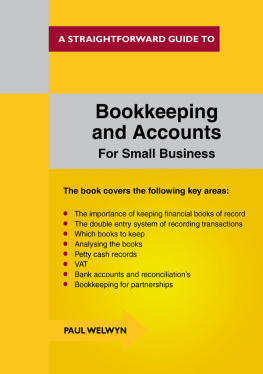
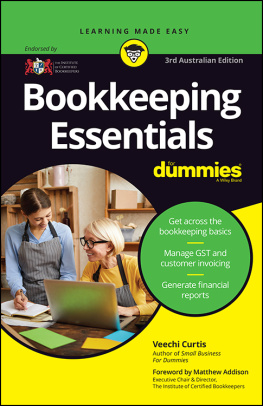
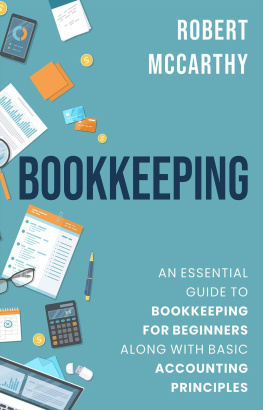
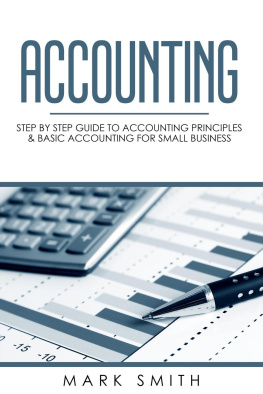
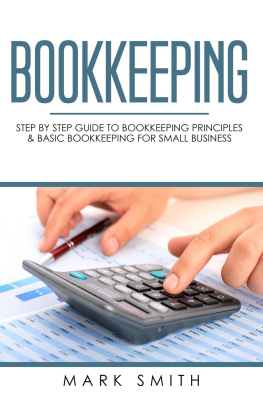
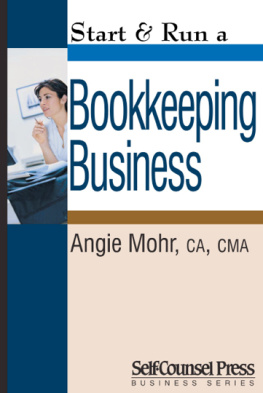
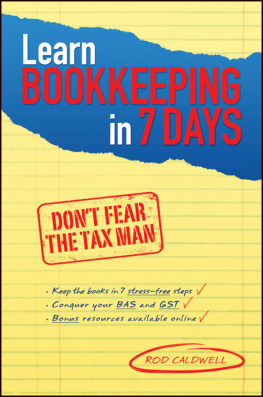
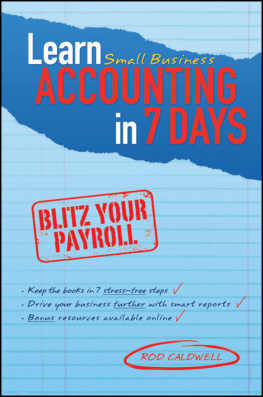
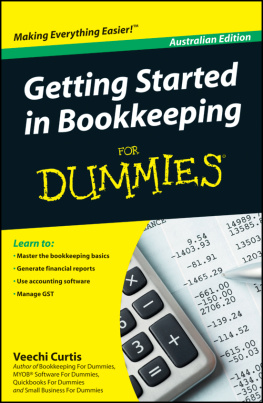
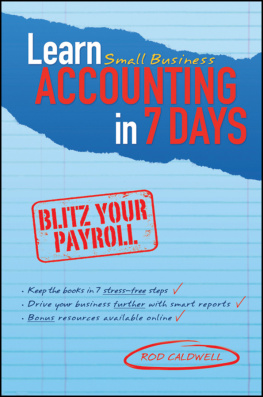
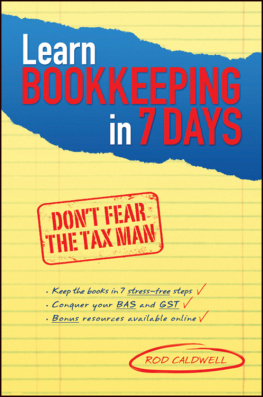
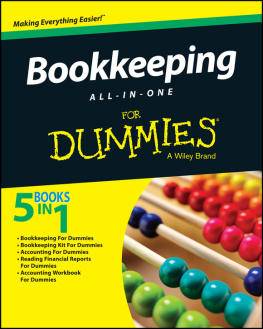
![Jane E. Kelly - Bookkeeping and Accounting All-in-One For Dummies [UK edition]](/uploads/posts/book/80164/thumbs/jane-e-kelly-bookkeeping-and-accounting.jpg)